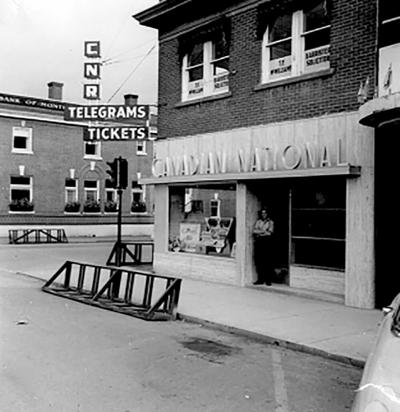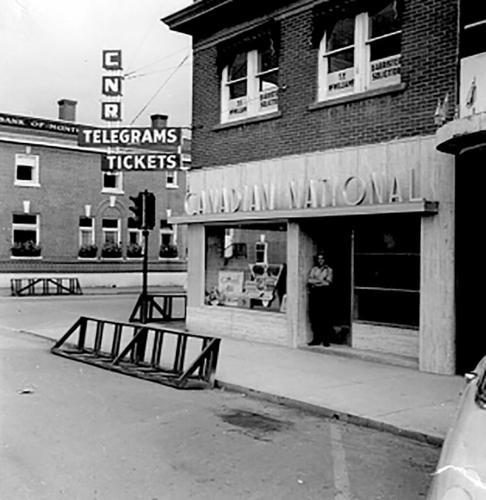In the early 1960s after having been Canadian National (CN) TelegraphОЪС»ґ«ГЅ ОЪС»ґ«ГЅ evening operator for eight or nine years, I became the ОЪС»ґ«ГЅ – Vernon swing relief manager and operator. This meant that after a rest day on Sunday, I would leave home in ОЪС»ґ«ГЅ at seven o’clock on Monday morning to drive to Vernon to relieve the manager there on his day off and also relieve the evening operatorВ there, until 11 p.m., completing two shifts back-to-back and then drive back home to ОЪС»ґ«ГЅ, arriving home at midnight.
Then I had two more rest days on Tuesday and Wednesday. Thursday and Friday, I worked evenings in ОЪС»ґ«ГЅ and on Saturday I covered the ОЪС»ґ«ГЅ managerОЪС»ґ«ГЅ day shift.
This was a good job as it gave me enough daytime hours through the week to look after and manage my orchards, which were located in the Benvoulin district.
The ОЪС»ґ«ГЅ CNR telegraph and city ticket offices were located in the CNR building – formerly the Paret Block – at the northeast corner of Bernard Avenue and Water Street, which is now part of the Canadian Imperial Bank of Commerce main branch.
An interesting event occurred one Saturday morning in early November, circa 1962. I arrived to work shortly before eight a.m., opening time. The previous dayОЪС»ґ«ГЅ rain had turned the snow to slush overnight and almost an inch of new snow covered the sidewalk. I did not bother to sweep the snow off as the rising sun would soon melt the snow.
While I was opening the safe, the front door opened and someone silently entered the front office and stood at the counter. It was a young man in his early 20s. He told me that he had earlier made a collect telephone call from a pay station to his father in New Brunswick, asking him to wire fifty dollars and was wondering if the money was here for him. I explained to him that I had just opened the office and hadn’t had a chance to clear the wire of overnight traffic.
In those days, the main Vancouver telegraph office was our relay point and all telegraph traffic to us came from there. As I worked the wire I noticed the young man silently pacing along the front of the office but gave it little thought as I was busy on the wire.
In the 1960s, a number of businesses were still quite active on Saturdays and due to higher telephone rates and poor voice quality, individuals still sent a lot of overnight telegrams, utilizing cheaper overnight rates, and so it took me a while to clear the wire. In the meantime our friendly ticket agent, Carman Woods, had arrived to work.
While I was busy, he tapped me on the shoulder, pointed to the young man, who was by this time napping on the front office customer bench, and whispered in my ear, “Tilman – no shoes.”
After I had cleared the wire I walked up to the counter and told the disappointed young man that no money order had arrived for him but that he was welcome to stay longer and wait for it to arrive.
Sure enough, he was barefoot and traces of his footprints still lingered in the now-melting snow on the sidewalk.
I said to him that it must have been a cold walk, to which he agreed and told me his story. Apparently he had been released from jail in Kamloops the previous morning and was hitch-hiking and got as far as the west side of the Okanagan Lake bridge and was soaking wet from the falling rain.
He hiked up the bank above the bridge and took shelter under one of the big pine trees growing there and lit a fire to warm up and dry out. He took off his boots and socks and put them close to the fire to dry out and promptly fell asleep. When he awoke, his boots and socks had caught fire and burned up and that is why he needed fifty dollars – to buys shoes and socks. It had been a long, cold barefoot walk in the snow to the ОЪС»ґ«ГЅ telegraph office.
In due course his money transfer arrived and I was able to pay him the fifty dollars, which made his day! I sent him up Bernard Avenue to see Grant Fumerton at Fumertons department store, to buy shoes and socks.
It would be interesting to speculate now, sixty years later, what became of that shoeless young man. I would hope that for the rest of his life he stayed out of jail and would never again have to walk barefoot in the snow.
—в¶Д”в¶Д”в¶Д”в¶Д”в¶Д”в¶Д”в¶Д”в¶Д”в¶Д”
The ОЪС»ґ«ГЅ Branch of the Okanagan Historical Society operates on the unceded traditional territory of the Syilx people. It gratefully acknowledges their traditional knowledge, the elders and all those who have gone before us.
This article is part of a series, submitted by the ОЪС»ґ«ГЅ Branch, Okanagan Historical Society. Additional information would be welcome at P.O. Box 22105, Capri P.O., ОЪС»ґ«ГЅ, ОЪС»ґ«ГЅ, V1Y 9N9.


